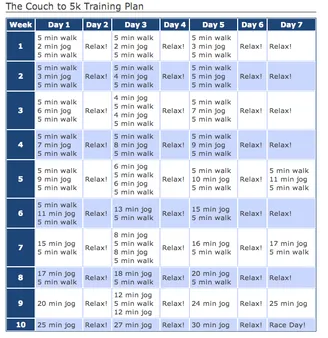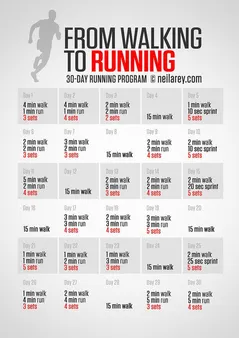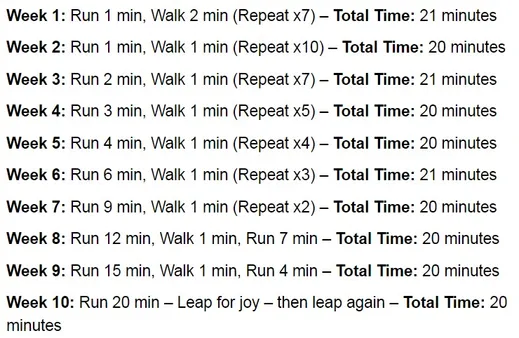Table of Contents
Unlock your running potential with Kizworld's guide on How to train like a runner. Discover the secrets to effective running training, from setting goals and designing a personalized plan to tracking progress and preventing injuries. Whether you're a beginner or an experienced runner, our comprehensive approach will help you achieve your running aspirations. Embrace the challenge and transform your running journey into a fulfilling and rewarding experience.
How to Train Like a Runner: A Comprehensive Guide for Beginners
I. How to Train Like a Runner: A Comprehensive Guide
How to Train Like a Runner: A Comprehensive Guide
Essential Elements for Effective Running Training
To become a skilled runner, it's crucial to adopt effective training strategies. This comprehensive guide will help you train like a pro, whether you're a beginner or an experienced runner. Discover the essential elements of successful running training, including setting goals, designing a training plan, and tracking your progress. Learn how to improve your endurance, speed, and form while minimizing the risk of injuries. With our advice, you'll be well on your way to achieving your running goals.
- Set realistic and specific goals.
- Design a training plan that suits your fitness level and goals.
- Track your progress and make adjustments as needed.
- Incorporate a variety of workouts, including easy runs, tempo runs, interval training, and hill workouts.
- Focus on improving your running form and technique.
- Strength train to improve your overall fitness and reduce the risk of injuries.
- Cross-train with other activities to improve your overall fitness and prevent boredom.
- Listen to your body and take rest days when needed.
- Stay hydrated and eat a healthy diet to support your training.
- Find a running partner or group to keep you motivated.
Training Strategies to Build Endurance
Building endurance is essential for runners of all levels. Here are some strategies to help you increase your endurance:
- Gradually increase your running distance and duration over time.
- Incorporate tempo runs into your training plan.
- Try interval training to improve your speed and endurance.
- Run on different terrains to challenge your muscles and build strength.
- Stay hydrated and eat a healthy diet to support your training.
- Listen to your body and take rest days when needed.
Read more about building endurance for running
Vary Your Runs for Comprehensive Development
Varying your runs is essential for comprehensive development as a runner. Here are some different types of runs to incorporate into your training plan:
- Easy runs: These are slow-paced runs that help you recover from harder workouts and build your aerobic base.
- Tempo runs: These are runs at a slightly faster pace than your easy runs. They help you improve your lactate threshold and build endurance.
- Interval training: This involves alternating between periods of high-intensity running and rest or low-intensity running. It helps you improve your speed and endurance.
- Hill workouts: These involve running up and down hills. They help you build strength and power.
- Long runs: These are runs that are longer than your usual runs. They help you build endurance and mental toughness.
Read more about varying your runs
Nutrition and Hydration for Peak Performance
Proper nutrition and hydration are essential for peak performance as a runner. Here are some tips to help you fuel your body for success:
- Eat a healthy diet that includes plenty of fruits, vegetables, whole grains, and lean protein.
- Stay hydrated by drinking plenty of water before, during, and after your runs.
- Consume carbohydrates before and during your runs to provide energy.
- Replenish your glycogen stores after your runs with a meal or snack that includes carbohydrates and protein.
- Avoid eating large meals or sugary foods before your runs.
Read more about nutrition and hydration for runners
Injury Prevention and Recovery Techniques
Preventing injuries and recovering properly from them is essential for staying healthy and improving as a runner. Here are some tips to help you stay injury-free:
- Warm up properly before your runs and cool down afterwards.
- Listen to your body and take rest days when needed.
- Strength train to improve your overall fitness and reduce the risk of injuries.
- Use proper running form and technique.
- Wear appropriate shoes and clothing for your runs.
- If you do get injured, seek professional medical help and follow their advice for recovery.
Read more about injury prevention and recovery for runners
II. Essential Elements of a Runner's Training Plan
Essential Elements of a Runner's Training Plan
A successful training plan for running requires careful consideration of several key elements. These include:
- Goal Setting: Clearly define your running goals, whether it's completing a race, improving your time, or simply staying fit.
- Training Schedule: Develop a structured schedule that outlines your runs, rest days, and cross-training activities.
- Exercise Variation: Incorporate different types of runs, such as easy runs, tempo runs, and interval training, to develop well-rounded fitness.
- Gradual Progression: Increase your training intensity and duration gradually to avoid injuries and plateaus.
- Recovery and Rest: Allow your body adequate time to recover between workouts and schedule rest days to prevent overtraining.
- Nutrition and Hydration: Fuel your body with a balanced diet and maintain proper hydration to support your running performance.
- Injury Prevention and Management: Learn proper running techniques, warm up and cool down before and after runs, and address any injuries promptly.
- Mental and Emotional Well-being: Stay motivated, set realistic expectations, and manage stress to maintain a positive outlook during your training.
Remember, consistency, dedication, and attention to these essential elements will help you achieve your running goals and enjoy the journey along the way.
Essential Nutrients for Runners
- Carbohydrates: Provide energy for your muscles during runs.
- Proteins: Aid in muscle recovery and growth.
- Fats: Provide sustained energy and support hormone production.
- Vitamins and Minerals: Essential for overall health and immune function.
- Water: Crucial for hydration and regulating body temperature.
Day | Type of Run | Distance/Duration |
Monday | Easy Run | 3-4 miles |
Tuesday | Interval Training | 4-5 x 400 meters at race pace |
Wednesday | Cross-training (e.g., swimming, cycling) | 30 minutes |
Thursday | Tempo Run | 2 miles at a pace faster than your easy run |
Friday | Recovery Run | 2-3 miles |
Saturday | Long Run | 6-8 miles, gradually increasing distance |
Sunday | Rest | Active rest or complete rest |
Consult with a qualified coach or healthcare professional to personalize your training plan and address any specific concerns or limitations you may have.
Check out our related articles on Training Like a Gymnast, Training Like a Surfer, and Training Like a Skateboarder for more inspiration and guidance in your fitness journey.
III. Effective Training Methods for Runners
Effective Training Methods for Runners
| Essential Training Tips for Runners | |
|---|---|
|
|
Developing a strong foundation in running requires dedication and consistency in training. Here are some proven methods to help you become a successful runner, whether you're a beginner or an experienced athlete:
- Warm-Up and Cool-Down: Start each run with a 5-10 minute brisk walk followed by dynamic stretches. Similarly, end your run with a 5-10 minute walk and static stretches to aid recovery.
- Speed Work: Incorporate interval training sessions to enhance your running speed and endurance. Alternate between short bursts of high-intensity running with periods of rest or slow jogging.
- Distance Runs: Gradually increase the distance of your runs to improve your endurance. Focus on maintaining a steady pace and proper form throughout the run.
- Cross-Training: Engage in non-running activities like swimming, cycling, or elliptical training to supplement your running workouts and reduce the risk of injuries.
- Strength Training: Include strength training exercises 2-3 times a week to strengthen your core and lower body muscles. Strong muscles will aid in better running form, prevent injuries, and enhance your performance.
- Yoga and Flexibility: Regular yoga and stretching sessions can improve your flexibility and range of motion, which are essential for efficient running. This can also help prevent injuries and enhance your overall performance.
- Hills and Trails: Vary your training routes by including hills and trails. Running on different terrains can challenge your muscles in unique ways, improving your overall strength and endurance.
Remember that consistency is key to achieving your running goals. Training should be challenging yet enjoyable, so find ways to make running a part of your lifestyle and not just an obligation. Also, don't forget to listen to your body and take rest days when needed. Happy running!
IV. Tips for Staying Motivated and Avoiding Injuries
Tips for Staying Motivated and Avoiding Injuries
- Set Realistic Goals: Start with achievable targets and gradually increase their difficulty as your fitness level improves.
- Plan Your Runs Wisely: Create a structured training plan that includes warm-ups, cool-downs, and rest days.
- Stay Accountable: Find a running partner or join a running group to keep each other motivated.
- Stay Connected: Follow running enthusiasts on social media for inspiration and support.
Stay Safe and Prevent Injuries
- Proper Warm-Up: Always warm up your muscles before starting your run to prevent strains and injuries.
- Listen to Your Body: Pay attention to signs of fatigue or pain and take breaks when needed.
- Use Proper Techniques: Learn and practice running techniques that minimize impact and reduce the risk of injuries.
- Cool Down and Stretch Afterwards: Stretching after a run helps muscles recover and prevents stiffness.
Remember, consistency, patience, and safety are key to improving your running skills and enjoying the journey.
V. Related Posts
- How to Improve Your Flexibility and Mobility with Gymnastics
- The Best Calisthenics Exercises and Variations
- How to Learn the Basic Boxing Skills and Techniques
VI. Conclusion
By following the strategies outlined in this comprehensive guide, you'll be well-equipped to train like a seasoned runner. Remember, consistency, dedication, and a positive mindset are key to achieving your running goals. Embrace the challenges of the journey, celebrate your achievements, and never stop striving for improvement. With Kizworld's guidance, you'll transform into a confident and capable runner, ready to conquer any distance or challenge that comes your way.